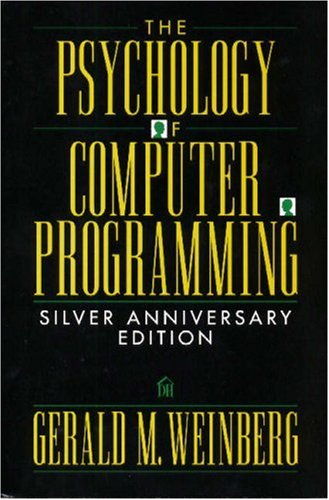Psychology of computer programming ebook
Par towler frank le dimanche, mai 15 2016, 11:01 - Lien permanent
Psychology of computer programming. Gerald M. Weinberg

Psychology.of.computer.programming.pdf
ISBN: 0932633420,9780932633422 | 299 pages | 8 Mb

Psychology of computer programming Gerald M. Weinberg
Publisher: Dorset House
Lilly referred to this self-programming ability as metaprogramming, and reported on his research in his . Weinberg is eminently quotable. Lilly's experiments showed that the brain could be treated as a programmable entity similar to a digital computer, but a computer which could program itself. Originally Released in 1971, follow ups added 1998. He had written The Psychology of Computer Programming in 1970, a number of papers about testing during the sixties, including a section on testing in his 1961 book, Fundamentals of Computer Programming. Even in the computer programmer example, although many are in fact quietly against H-1B visas, those that support the visas might see the appearance of being progressive and non-confrontational as being in their self-interest. So this is it; modern psychology, computer programming and neurophysiology meets ancient mysticism. Paterfamilias of "American Chopper," observed that when you're sitting across the table negotiating a business contract, the fact that the other guy realizes you could beat the living crap out of him gives you a valuable psychological edge. Weinberg's The Psychology of Computer Programming, which I first read in 1982. The above explains why Gerald Weinberg, in The Psychology of Computer Programming (written in the 1970s, and still applicable), states that if a programmer becomes indispensable, you should fire him immediately. Reduction of computer fears was examined by comparing changes in computer attitudes over a semester among two introductory computer programming classes and one introductory psychology class (N=50). Weinberg had a study of how you could tell the native programming language of the student by their PL/I code. If computer But on another, it's a psychological paradigm which functions in much the same way as a natural language: lifelong programmers develop a tendency to look at everything in their lives as a series of algorithms, and so on. "The Psychology of Computer Programming: Silver Anniversary Edition" by Gerald M. Mostly a lot of questions to think about. A thought provoking book on how humans program, and how they interact with others. I think the major culprit is Gerald Weinberg's book, The Psychology of Computer Programming: Silvery Anniversary Edition. Murnane, 1993) most research about the cognitive effects of computer programming seemed to have focused on programming as a problem solving rather than a linguistic activity. What made me change my mind and become a professional programmer? With a few notable exceptions (e.g.
Semiconductor Manufacturing Technology ebook